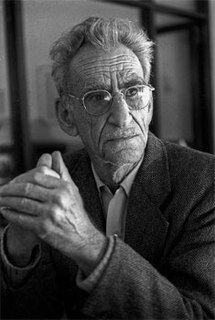A Quote by Alexander Pope
I would not be like those Authors, who forgive themselves some particular lines for the sake of a whole Poem, and vice versa a whole Poem for the sake of some particular lines. I believe no one qualification is so likely to make a good writer, as the power of rejecting his own thoughts.
Related Quotes
I keep feeling that there isn't one poem being written by any one of us - or a book or anything like that. The whole life of us writers, the whole product I guess I mean, is the one long poem - a community effort if you will. It's all the same poem. It doesn't belong to any one writer - it's God's poem perhaps. Or God's people's poem.
The poem builds in my mind and sits there, as if in a register, until the poem, or a piece of a longer poem, is finished enough to write down. I can hold several lines in my head for quite some time, but as soon as they are written down, the register clears, as it were, and I have to work with what is on the paper.
A successful poem says what a poet wants to say, and more, with particular finality. The remarks he makes about his poems are incidental when the poem is good, or embarrassing or absurd when it is bad and he is not permitted to say how the good poem is good, and may never know how the bad poem is bad. It is better to write about other people's poetry.
In this respect a program is like a poem: you cannot write a poem without writing it. Yet people talk about programming as if it were a production process and measure "programmer productivity" in terms of "number of lines of code produced". In so doing they book that number on the wrong side of the ledger: we should always refer to "the number of lines of code spent".
If, then, there is some end of the things we do, which we desire for its own sake (everything else being desired for the sake of this), and if we do not choose everything for the sake of something else (for at that rate the process would go on to infinity, so that our desire would be empty and vain), clearly this must be the good and the chief good.
As soon as I start to write I'm very aware, I'm trying to be aware that a reader just might well pick up this poem, a stranger. So when I'm writing - and I think that this is important for all writers - I'm trying to be a writer and a reader back and forth. I write two lines or three lines. I will immediately stop and turn into a reader instead of a writer, and I'll read those lines as if I had never seen them before and as if I had never written them.
Some help others in order to receive blessings and admiration. This is simply meaningless. Some cultivate themselves in part to serve others, in part to serve their own pride. They will understand, at best, half of the truth. But those who improve themselves for the sake of the world - to these, the whole truth of the universe will be revealed.
It was early on in 1965 when I wrote some of my first poems. I sent a poem to 'Harper's' magazine because they paid a dollar a line. I had an eighteen-line poem, and just as I was putting it into the envelope, I stopped and decided to make it a thirty-six-line poem. It seemed like the poem came back the next day: no letter, nothing.





































